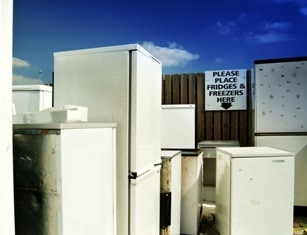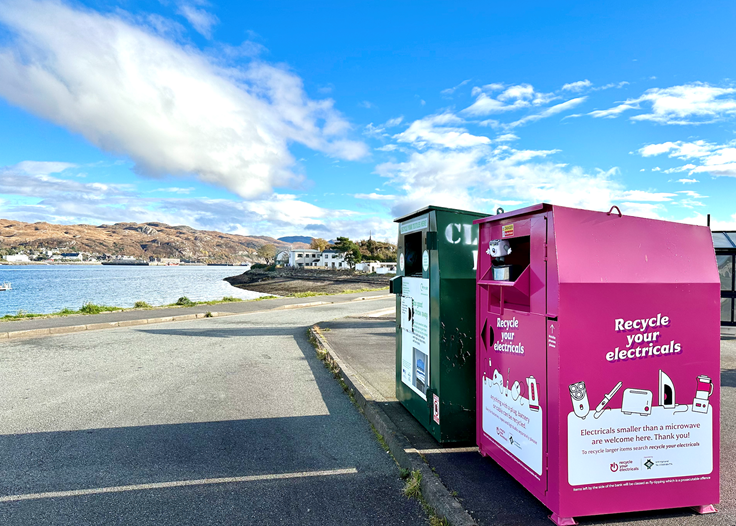Local authorities have called for the WEEE system to be made fairer and more transparent and for more clarity in regulations concerning the operation of civic amenity sites collecting WEEE.

And, the Local Government Association has revealed that in terms of local authority involvement, it has concerns about funding being lost to those who are doing the leg work.
The current debate centres on the role of civic amenity sites, most of which are registered as designated collection facilities (DCFs) under the UK system for collecting waste electrical and electronic equipment (WEEE).
Local authorities have reacted to issues raised by the WEEE Schemes Forum which represents compliance schemes. The Forum said that councils are increasingly looking to extract value from WEEE collected at DCFs by, for example, diverting WEEE items into scrap metal and demanding money for collection contracts, all considered contrary to the rules covering DCFs.
This prompted the Department for Business Innovation and Skills (BIS) to write last week to councils to remind them of their obligations under the DCF code of practice
(see letsrecycle.com story).
The Local Government Association, told letsrecycle.com that the transposition of the WEEE recast provides the government with an opportunity to scrutinise current legislation, which currently has an imbalance between effort and reward for WEEE recycling which may need addressing.
A spokesman said: The existence of these third party compliance schemes can see the funding lost to those who are doing the leg work and the relationship between the effort and reward can be diminished.
LARAC
Strong views on the importance of producers shouldering a fair responsibility for their products which become WEEE were expressed by recycling officers organisation LARAC. However, LARAC also accepted that there were existing contract rules which local authorities should adhere to.
LARAC representative Lee Marshall, who ispolicy and waste managerfor Powys county councilsaid: From my point of view, the code of practice has been in place for a while, and compliance schemes and local authorities sign up from both sides and know their obligations.
There may be an issue about whether or not things need to change. In the current economic climate, local authorities are under pressure to look at all the costs and make them more efficient and this might be one way they might look to do that.
Phil Robson, who also speaks on WEEE matters for LARAC and who is waste and recycling officer at Westminster city council, argued that future WEEE legislation needs to ensure that the burden for the collection of WEEE does not rest on local authority-run civic amenity sites.
Phil Robson, LARAC
He said: The broader issue is for producer responsibility legislation to be fair and reasonable, and to ensure that the producers must be the ones to bear the cost.
If we were starting from scratch, [the legislation] would not be anything like it is at the moment, it is an unwieldy and bureaucratic piece of legislation. The intention is very positive, and we have come a long way since producer compliance schemes came in, but if we were starting again we would possibly start somewhere else. Id like to see a greater use of in store take-back facilities, but I can see why the civic amenity sites have been used, as the network was already in place.
Transparency
Representative of the National Association of Waste Disposal Officers (NAWDO) said that councils needed far more transparency from compliance schemes about how the WEEE system operated.
John Woodruff, chair of NAWDO and head of waste services at the London borough of Bromley, claimed that uncertainty about what is permitted under the code could cause problems for councils agreeing deals with waste management companies.
He said: Generally, we welcome any review of the code of practice because it will help us self audit and ensure that we are doing things correctly. We do have a concern about the producer compliance system and the need to make sure that producer compliance schemes are not over or under collecting.We dont think that this is clear to local authorities at the moment and if there is an issue of over or under collection of WEEE, there isnt a mechanism to make individual authorities aware of it.
Mr Woodruff added: Each local authority is comfortable generally with the code of practice but we dont see the wider picture, which is not particularly transparent to us. We dont see what our producer compliance scheme is doing and how this fits into the national picture.”
Materials
Paul Borrett, also from NAWDO, said that once signed up to the code of practice, councils do not have a right to cherry pick valuable materials, but, argued that collecting WEEE can still have a cost for local authorities which should be borne by producers.
He said: Most authorities have sought to register their sites as DCFs on the basis that they can obtain a free collection of material and make sure that they have a process in place for recycling and reuse. That comes at a cost in as much as you have to give something away that at one stage would have had value, for example, if it was added to the light iron pile.”
Mr Borrett added: I have sympathy with some councils who still have to bear the cost of acceptance of materials on those sites, for example the costs involved if they are contracting out the management of civic amenity sites.
Mr Borretts view was echoed by Hannah Rogers of West Sussex county council who is a local authority representative on the Environment Agencys WEEE Operational Liason Group. She pointed out that the number of different arrangements that local authorities operate at civic amenity sites can cause problems for the way WEEE recycling is managed.
She said: If you take a household waste recycling centre it can have 15 or 20 material streams going to different reprocessors, some authorities will have one contractor to take responsibility for the site and other authorities are directly contracting out themselves for different waste streams.”
Ms Rogers added: There are additional costs that arent strictly covered, you have gone from three material streams to five because you have split what would have been the scrap metal bin to include LDA and small appliances and there is an additional cost in managing that. Producer compliance schemes cover the costs from collection onwards but that doesnt cover site management.
Discussions
It is thoughtthat the WEEE Schemes Forum will further discuss the issues concerning the code of practice and local authorities too will reassess procedures at their respective organisation meetings.










Subscribe for free